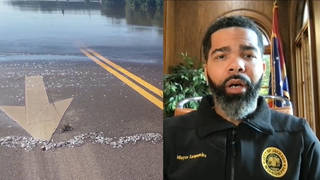
By Amy Goodman & Denis Moynihan
Jackson, the state capital of Mississippi, has a population of over 150,000 people, more than 80% of whom are African American. Mississippi is the poorest state in the country. Jackson residents, already under a water boil notice for over a month, have now had no running water for days, to drink, to bathe in, or to flush toilets. The Pearl River flooded following record rainfall, overwhelming the city’s water treatment plant. On Sunday, Mayor Chokwe Antar Lumumba urged city residents, “If you are capable of getting out now, get out now.” Jackson has been paralyzed by the confluence of racism, classism, and the worsening climate crisis.
On Tuesday, President Joe Biden declared an emergency for Jackson and surrounding Hinds county, promising federal funding to pay the bulk of disaster recovery costs for at least 90 days. A rented pump was put into service at the water facility on Wednesday, and may help restore water service within a week.
But that is only a temporary fix. Jackson’s water problems run far deeper. “We are seeing the intentional divestment in communities that are led by Black elected officials,” Jackson resident and social justice organizer Danyelle Holmes told Reuters at a water distribution center this week. “This has been an issue for me since I came down here…in 1991. I was always told not to drink that water.”
The climate-fueled polar vortex that descended on Texas in February, 2021, shutting down that state’s electrical grid and subjecting millions of Texans to devastating cold, killing an estimated 700 people, also hit other Southern states. Jackson’s water treatment plant froze then, shutting off residents’ access to water. Mississippi’s Governor Tate Reeves and Lieutenant Governor Delbert Hosemann, both white Republicans, blamed Jackson for that crisis. “I do think it’s really important that the city of Jackson start collecting their water bill payments before they start going and asking everyone else to pony up more money,” Gov. Reeves told the press last year, as Jackson was in its third week without water.
“The city of Jackson was not ill-prepared based on the winter storms; we were ill-equipped,” Mayor Chokwe Antar Lumumba responded back then, speaking on the Democracy Now! news hour. “We’ve had resources stripped away from us.”
Jackson was founded two hundred years ago, named in honor of Andrew Jackson, a wealthy plantation owner who made a fortune using enslaved labor and who later, as the seventh president of the United States, orchestrated the ethnic cleansing of much of the South’s indigenous population in what became known as the Trail of Tears. Union General William Tecumseh Sherman ordered the city burned to the ground during the Civil War.
Later, Jackson suffered some of the worst racist violence as Jim Crow laws disenfranchised African Americans across the South and white supremacist terrorism waged by the Ku Klux Klan and others drove millions of Blacks north in the Great Migration. In 1963, Medgar Evers, the NAACP’s Mississippi field secretary, was assassinated outside his Jackson home. This followed the violence and arrests targeting hundreds of Freedom Riders who arrived in Jackson in the summer of 1961, challenging segregation of interstate travel. In 1964, three civil rights workers – James Chaney, Andrew Goodman and Michael Schwerner – were murdered in nearby Neshoba County for helping the Black community organize voter registration. Their bodies were buried in a dam being built on a farm to impound water that would have flowed into the Pearl River, upstream from Jackson. On May 15th, 1970, two students at Jackson State, the historically Black college, were killed by local police during an anti-war protest. Their deaths received little attention compared to the four white protesters killed by the National Guard at Kent State University in Ohio, eleven days earlier.
“What we are experiencing now is literally just the crumbling of the empire’s infrastructure,” Kali Akuno, co-founder of Cooperation Jackson, which promotes worker-owned coops and a solidarity economy, said on Democracy Now! “It goes back to the 1950s and ’60s with the so-called urban renewal programs and the massive subsidization of the suburbs, which facilitated white flight out of many of these major cities, Jackson being one of them. With that went major capital flight and…chronic programs of divestment and deindustrialization.”
Akuno heeded Mayor Lumumba’s warning to flee the flooding this week, and was in New Orleans, remotely coordinating Cooperation Jackson’s water distribution efforts.
Repairing Jackson’s infrastructure will take an estimated $2 billion. That’s a tiny fraction of the public funds allocated by the recently enacted infrastructure and climate change bills. The resources exist to solve Jackson’s current catastrophe. It will take solidarity on a national level to overcome the triple, ongoing impacts assaulting the citizens of Jackson, Mississippi: racism, classism and the spiraling disaster of climate change.












Media Options